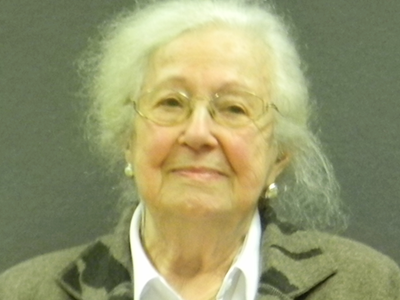Erna de Vries was born in Kaiserslautern in 1923. Her father Jacob Korn was an evangelical Christian, and her mother, Jeanette Korn, nee Loewenstein, was Jewish. The parents raised their daughter within the Jewish faith.
Together with a partner, the father ran a moving company named „Sauerhoefer und Korn”, but he passed away early, in 1931, when Erna was eight years of age. Her mother continued to run the business after the death of her father with his business partner. Reprisals against Jews made it more and more impossible for Erna’s mother to continue to do so, and she withdrew from the business, living off savings she had made from her share of the business.
Erna first attended a private Catholic school for girls, but in later years the fees couldn’t be met anymore, and Erna changed to a special class for Jews in a school in Kaiserslautern. After school NC she worked in a Jewish sewing business but it was her wish to become a doctor.

Erna de Vries
In the morning after Kristallnacht (9th to 10th November 1938) the Korns’ home was completely devastated. While her mother, after a short stay with her brother in Cologne, returned to Kaiserslautern, Erna stayed in Cologne and started to work as an apprentice nurse in a Jewish hospital, in order to work a little way towards her dream of becoming a doctor.
After she had heard about Jewish deportations, she returned to Kaiserslautern to be closer to her mother and started to work at an iron foundry. Her mother was deported in July 1943, and Erna accompanied her, of her own free will, to Saarbrucken, where both were put into a Gestapo prison. „So I ended up in prison with my mother, in Saarbrucken She was unhappy that I had managed to. But I didn’t care (…), I wanted to be with my mother.“ Together they were transported to the concentration camp in Auschwitz in July 1943. She worked in the camp at the beginning, but she suffered injuries on her leg, which did not heal and got badly infected. On 15th September 1943 she was therefore transferred to the death block number 25.
Early in the morning of the following day, the inmates of the block were driven towards a truck. A terrible chaos ensued – everyone screamed, stumbled, fell over one another, pulled their hair in desperation – it was like hell in hell. Erna just let herself fall to the ground: „I just had one wish, I wanted to see the sun a last time. I thought that if I saw the sun, nothing terrible will happen to me. (…)… and I saw the sun.“
She heard someone call out her prisoner’s number. The caller was an SS-man, to whom she revealed herself – and so escaped being gassed to death at the very last moment.
Erna Korn was spared execution, because as a so-called first degree Jewish mongrel, she was supposed to be transported to the KZ Ravensbruck to do forced labor. She just managed to say her farewells to her mother at Auschwitz, who was murdered there on 8th November 1943.
On 16th September 1943, the transport reached the women’s concentration camp Ravensbruck. Here too, Erna was first put into quarantine, where she was reunited with Libusé Ingrova, a Czech prisoner, with who she shared a block at Auschwitz. The two women became friends. As Libusé Ingrova had access to the kitchens of the camp, she was able to provide Erna with extra bread rations.
In Ravensbruck, Erna’s wounds were given a first if provisional treatment. All-in-all, conditions at this concentration camp were better than at the extermination camp Auschwitz-Birkenau.
In 1944, now aged 20, Erna Korn was transferred to the attached Siemens factory. Here she had to work for the arms industry until the plant was closed on 14th April 1945, and she was sent back to the main camp.
From 27th April 1945, the concentration camp Ravensbruck was being emptied. All prisoners still able to walk were forced onto a march in a north-westerly direction, the rest were left to die. For several days, Erna Korn and other inmates were forced across the devastated countryside on this „death march“. Erna was exhausted and ready to give up, but her friends from the camp made her go on and convinced her to continue walking. Sometime later, the trek was liberated by allied soldiers in the state of Mecklenburg.
After the war, in 1947, Erna met her husband-to-be, Josef de Vries, in Cologne.
„My husband had been in the camps for six years. Even though he survived it, he lost his entire family, his wife and his child. I talked to him again and again. I believe that it was through that – that we got over it in some ways. Talking about it, again and again, with the other person knowing exactly what you were talking about.“
Erna de Vries, 2006
Since 1998, Erna has been visiting schools and other educational facilities to tell young Germans her story. She is fulfilling the mission her mother gave her:“You will survive, and then you will speak about what they did to us.“
Sources: Conversations with Erna de Vries in March 2012, wikipedia.de; projektzeitlupe.de.